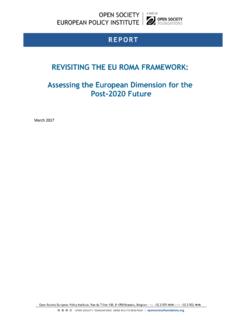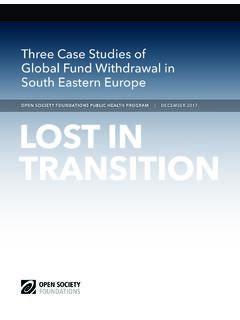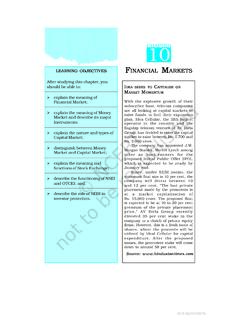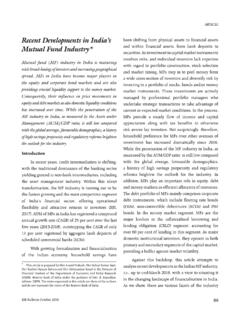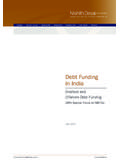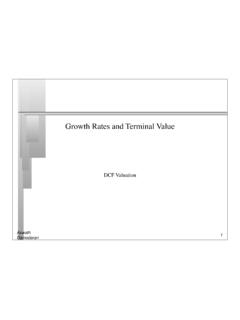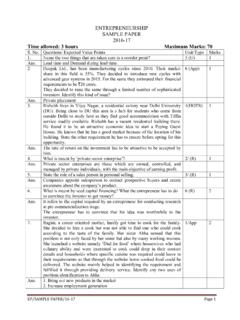Transcription of GLOBALIZATION AND HIGHER EDUCATION
1 EDUCATION Support Program OSI EDUCATION Conference 2005: EDUCATION and Open Society: A Critical Look at New Perspectives and Demands GLOBALIZATION , educational trends and the open society Martin Carnoy Stanford University, School of EDUCATION 1 GLOBALIZATION , educational trends, and the open society 1. Introduction Historic changes are transforming the lives of people in the developed countries and most developing ones. National economies and even national cultures are globalizing.
2 GLOBALIZATION means more competition, not just with other companies in the same city or the same region. GLOBALIZATION also means that national borders do not limit a nation s investment , production, and innovation. Everything, including relations among family and friends, is rapidly becoming organized around a much more compressed view of space and time. Companies in Europe, the United States, and Japan can produce chips in Singapore, keypunch data in India or the Peoples Republic of China, out source clerical work to Ireland or Mexico, and sell worldwide, barely concerned about the long distances or the variety of cultures involved.
3 Swatch now sells a watch that tells Internet time, a continuous time that is the same everywhere in the world. Even children watching television or listening to radio are re-conceptualizing their world, in terms of the meanings that they attach to music, the environment, sports, or race and ethnicity. A global economy is not a world economy. That has existed since at least the sixteenth century (Braudel, 1979). Rather, a global economy is one where strategic, core activities, including innovation, finance and corporate management, function on a planetary scale on real time (Carnoy, Castells, Cohen, and Cardoso, 1993; Castells, 1996).
4 1 And this globality became possible only recently because of the technological infrastructure provided by improved telecommunication networks, information systems, including the Internet, microelectronics machinery, and computerized transportation 2 systems. Today, as distinct from even a generation ago, capital, technology, management, information, and core markets are globalized. GLOBALIZATION together with new information technology and the innovative processes they foment are driving a revolution in the organization of work, the production of goods and services, relations among nations, and even local culture.
5 No community is immune from the effects of this revolution. It is changing the very fundamentals of human relations and social life. Two of the main bases of GLOBALIZATION are information and innovation, and they, in turn, are highly knowledge intensive. Internationalized and fast-growing information industries produce knowledge goods and services. Today s massive movements of capital depend on information, communication, and knowledge in global markets. And because knowledge is highly portable, it lends itself easily to GLOBALIZATION .
6 If knowledge is fundamental to GLOBALIZATION , GLOBALIZATION should also have a profound impact on the transmission of knowledge. In this essay, I suggest that it does, and that its effects are felt throughout the educational system. The effects are of two kinds. The first is that GLOBALIZATION increases the demand for EDUCATION , especially university EDUCATION , and this increases pressure on the whole system for HIGHER quality schooling, often producing perverse educational consequences, particularly from the standpoint of equity.
7 An important question for democratic societies and societies transitioning to democracy is whether HIGHER quality EDUCATION for all is necessarily consistent with individual-centric democracy, particularly in societies marked by deeply-rooted ethnic conflicts and weak states. 1. Real time is, in entertainment parlance, live, meaning that information is 3 The second effect is that GLOBALIZATION produces a reaction.
8 This reaction takes many forms, but it seems in the current historical conjuncture to be increasingly focused on ethnic-religious nationalism/regionalism. The implications of the reaction for the transmission of knowledge are also important. Ethnic-religious nationalism represents a search for an identity that is often the antithesis of globalism/internationalism and even individualism. In some cases (religious-based nationalism) it confronts the concept of globalized knowledge as interpreted by the West with a different form of globalized (universal) knowledge, namely religious fundamentalism.
9 In other cases, it confronts globalized knowledge with localized notions of knowledge/identity. In this paper. I outline the complexities of these issues systematically, beginning with the first type of effect and its contradictions within the framework of democratic or becoming democratic societies. Then I turn to a discussion of the conflicting search for identity notion of knowledge transmission. 2. GLOBALIZATION and the Increased Demand for EDUCATION Why does GLOBALIZATION increase the demand for EDUCATION and for educational quality?
10 The answer lies in two parts. The first is economic: rising payoffs to HIGHER EDUCATION in a global, science based, knowledge intensive economy make university training more of a necessity to get good jobs. This, in turn, changes the stakes at lower levels of schooling, and drastically changes the function of secondary school. The second part is socio-political: demographics (the changing family) and democratic ideals exchanged or communicated as it is produced.

